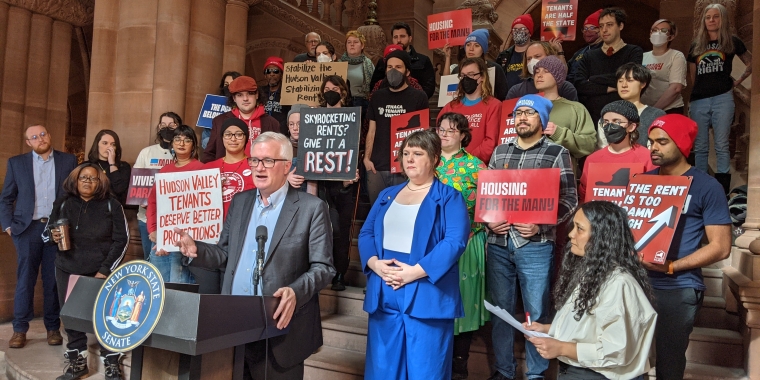The Real Deal: State Tweaks Housing Conversion Proposal for Offices, Hotels

On February 24, 2021, Kathryn Brenzel covered recent changes to the provision included in the Executive Budget proposal to facillitate conversion of hotels and other commericial spaces to permanent housing, including Senator Kavanagh's comments and a related bill he has introduced. The full text of the story is below; the original is available via the link above.
_______________
State Tweaks Housing Conversion Proposal for Offices, Hotels
Critics say affordability requirements still fall short
By Kathryn Brenzel
February 24, 2021
The state has tweaked its proposal for the conversion of offices and hotels to housing, limiting which buildings would be eligible. But some feel that the measure still doesn’t go far enough in creating new affordable housing.
Gov. Andrew Cuomo’s initial budget bill offered a temporary window for owners to override local zoning rules to turn vacant and struggling office properties into housing. Now, a series of amendments provides that only certain old office buildings and new ones in financial distress could be converted.
Specifically, the measure applies to office properties that either had a certificate of occupancy as of Jan. 1, 1980, or had one as of Dec. 31, 2020, and are also bankrupt or under receivership.
Two options for meeting the initial measure’s affordability requirements have also been eliminated. Hotels and offices that are converted must set aside 25 percent of residential units as affordable, through an agreement with the state’s housing regulator. In an earlier version, that threshold was 20 percent, and property owners could opt to use the property for supportive housing or pay into an affordable housing fund.
The amendments also shorten by two years the time that owners have to pursue such conversions. The law would expire at the end of 2024.
But some feel the measure largely incentivizes the creation of market-rate and luxury housing.
“Big picture, I don’t think this is the proposal we need right now,” said Rachel Fee, executive director of the New York Housing Conference. “On balance, this is going to add to our supply of luxury rentals.”
State Sen. Brian Kavanagh has pitched an alternative that would automatically approve certain hotels for residential use. Under a separate bill, hotels could be used to house low- to moderate-income tenants through an agreement with the city’s Department of Housing Preservation and Development.
At least part of a hotel must be within 800 feet of a district that allows residential use to be converted into housing. Certificates of occupancy issued to such hotels would simultaneously be authorized for residential use. Unlike the budget measure, this bill would not expire.
In an interview, Kavanagh said his bill focuses on hotels because they are likely easier to convert than office buildings. The 800-foot clause aims to allow conversions in areas with necessary services, such as transportation, and not in manufacturing zones.
“We don’t want to lose hotels that we need just to create more luxury housing,” said Ted Houghton, president of Gateway Housing NYC, who advised on the Kavanagh bill. “We want to find hotels that are in real distress that can be used for affordable housing for homeless New Yorkers and those in need.”
Cuomo’s new budget language includes a change similar to Kavanagh’s bill, calling for every certificate issued for hotels to allow for residential occupancy as well, in cases where the developer has an agreement with the state to set aside units as affordable.
Like the rest of the budget bill, it does not define affordable housing but leaves that distinction up to the state’s Division of Homes and Community Renewal or the city’s housing agency. This provision would also expire in 2024.
“These proposals speed development through what would be years of bureaucratic processes by allowing for the conversion of unprecedented vacancies in commercial spaces to highly needed affordable and supportive housing,” Freeman Klopott, a spokesperson for the state Division of the Budget, said in a statement.
He noted that the 25 percent set-aside is a baseline requirement and that the budget bill leaves the door open for the state to impose further regulations.
The changes to Cuomo’s amendments have created some confusion over whether hotel and office conversions would be permitted in manufacturing districts. Klopott said such conversions would be allowed. The amendments, he said, would not affect residential conversions in districts where they are already allowed.
The geographical boundaries for hotels and offices eligible for conversions have also been changed. The budget bill would apply to office buildings below 60th Street in Manhattan, expanding the previous area, which was largely limited to Midtown.
The amendments reverse the boundaries set for hotels in Manhattan, now excluding those between the Financial District and 110th Street. Hotels north of that or outside Manhattan are eligible for conversions, according to the amendments.
The changes to the budget measure appear to ignore the concerns raised by Mayor Bill de Blasio, who complained that it supersedes local zoning and hands control to “wealthy real estate interests.”
Mitch Korbey, partner and chair of Herrick’s land use and zoning group, said the discussion of recycling existing building stock, especially to create affordable housing and help the city recover, is important. But he said several issues need to be addressed by the city and state.
“The question really is, how best to vet these ideas and how best to assess their impact?” said Korbey. “What does it mean for density levels if a building can just create hundreds of units in a former office building? If you can, what does that say about the ability of the local infrastructure to handle it?”
###



